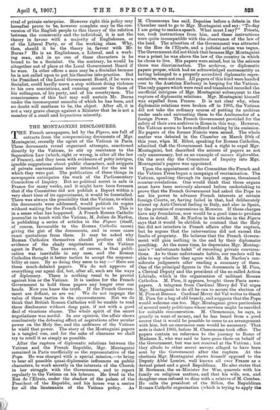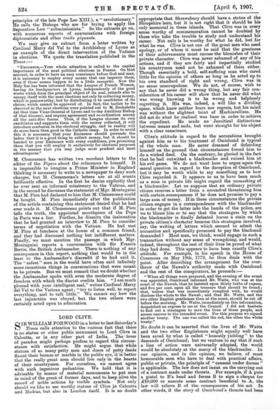THE MONTAGNINI DISCLOSURES.
THE French newspapers, led by the Figaro, are full of extracts from the compromising documents of Mgr. Montagnini, recently the agent of the Vatican in Paris. These documents reveal organised attempts, sanctioned directly by the Vatican, to stir up resistance to the Separation Law (which, right or wrong, is after all the law of France), and they teem with evidences of petty intrigue, ignoble suggestions about public characters, and snippets of private conversations never intended for the use to which they were put. The publication of these things in newspapers anticipates the work of the Parliamentary Committee of Inquiry. But no political secret is safe in France for many weeks, and it might have been foreseen that if the Committee did not publish a Report within a very short time of its appointment, it would be forestalled. There was always the possibility that the Vatican, to which the documents were addressed, would publish its copies without waiting for the French Committee to act. This is in a sense what has happened. A French Roman Catholic journalist in touch with the Vatican, M. Julien de Narfon, is publishing a series of articles in the Figaro (itself, of course, favourable to the Roman Catholic cause) giving the gist of the documents, and in some cases exact quotations from them. It may be asked why Roman Catholics themselves should produce all this evidence of the shady negotiations of the Vatican agent in Paris. The answer, of course, is that publi- cation was inevitable in any case, and the Roman Catholics thought it better tactics to accept the responsi- bility at once. By so doing they seem to say :--` Here are these much-debated papers. We do not approve of everything our agent did, but, after all, such are the ways of diplomacy. There is nothing venal to be proved against him or the Vatican. It is useless for the French Government to hold these papers any longer over our heads. Now you know the truth. If the French Govern- ment are defiant, so are we.' We do not impugn the value of these tactics in the circumstances. But we do think that British Roman Catholics will be unable to read these disclosures without deep pain, if not with a good deal of vicarious shame. The whole spirit of the secret negotiations was sordid. In our opinion, the affair shows conclusively the debasing effect of aspirations after secular power on the Holy See, and the unfitness of the Vatican to wield that power. The story of the Montagnini papers is a tangled one, and for the sake of clearness we shall try to retell it as simply as possible.
After the rupture of diplomatic relations between the Vatican and the French Republic, Mgr. Montagnini remained in Paris unofficially as the representative of the Pope. He was charged with a special mission,—to bring to bear all possible quasi-diplomatic influences on public characters, to work secretly in the interests of the Church ill her struggle with the Government, and to report regularly to the:Vatican on his labours. He lived in the Rue de l'Elysee, under the shadow of the. palace of the President .of the Republic, and his house was a centre for all the lieutenants of the. Vatican policy. As
M. Clemenceau has said, Deputies before a. debate in the Chamber used to go to Mgr. Montagnini and say: "To•day I am going to make aspeech. What must I say?" Priests, too, took instructions from him, and these instructions were quite incompatible with the observance of the law of the land. The attention of the Government was attracted to the Rue de l'Elysee, and a judicial action was begun. The Government did not think that because Mgr. Montagnini was a priest he was above the law of the country in which he chose to live. His papers were seized, but in the seizure there was discrimination. The archives, or diplomatic papers proper, which had an acknowledged sacrosanctity as having belonged to a properly accredited diplomatic repre- sentative, were not read. All papers of this kind were handed over to the Austrian Embassy in keeping for the Vatican. The only papers which were read and translated recorded the unofficial intrigues of Mgr. Montagnini subsequent to the rupture of diplomatic relations. Mgr. Montagnini himself was expelled from France. It is not clear why, when diplomatic relations were broken off in 1905, the Vatican did not take the ordinary course of putting its archives under seals and entrusting them to the Ambassador of a foreign Power. The French Government provided for the safety of their own archives in Rome in this way. However, the Vatican seems to have suffered nothing by its omission. No papers of the former Nuncio were seized. The whole matter was debated in the Chamber on March 20th of this year, wh,en M Ribot, speaking for Roman Catholics, admitted thA the Government had a right to expel Mgr. Montagnini, but described the seizure of papers as not only unnecessary, but as an example of Inteurs deplorables. On the next day the Committee of Inquiry into Mgr. Montagnini's papers was appointed.
Upon the appointment of the Committee the French and the Vatican Press began a campaign of recrimination. The Vatican, speaking through its inspired organs, threatened counter-revelations. One would think that these organs must have been seriously alarmed before undertaking to prove that the French Government had asked the Pope to use his power to advance French interests at certain foreign Courts, or, having failed in that, had deliberately stirred up Anti-Clerical feeling in Italy, and also in Spain, by the promise of concessions in Morocco. If those charges have any foundation, now would be a good time to produce them in detail. M. de Narfon in his articles in the Figaro says that it would be childish to contend that the Holy See did not interfere in French affairs after the rupture, but he argues that the intervention did not exceed the limits of propriety. He believes that the French Govern- ment will gain nothing in the end by their diplomatic poaching. At the same time, he deprecates Mgr. Montag- nini's " unfortunate habit " of recording private conversa- tions. As to these unfortunate habits, our readers will be able to say whether they agree with M. de Narfon's con- siderate judgments after reading a summary of them. One of the principal figures in the documents is M. Piou, a Clerical Deputy and the president of the so-called Action Liberale, which is the organisation of militant Roman Catholics. M. Piou, it appears, bought three Paris news- papers. A telegram from Cardinal Merry del Val urges Mgr. Montagnini to do all he can to secure the election of M. Piou at Rennes. Cardinal Merry del Val writes to thank M. Piou for a keg of old brandy, and suggests that the Pope would welcome one too. Mgr. Montagnini gives'particulars of several needy politicians whose services might be enrolled for suitable remuneration. M. Clemenceau, he says, is
greatly in want of money, and he has heard from a good source that it would be possible to come to an arrangement with him, but an enormous sum would be necessary. That note is dated 1905, before M. Clemenceau took office. The papers contain no reference to the journey to Rome of Madame X, who was said to have gone there on behalf of the Government, but was not received at the Vatican ; but they allude to other secret envoys alleged to have been sent by the Government after the rupture. At the elections Mgr. Montaguini shows himself opposed to the Deputy Abbe Lemire, well known all over France as a devout priest and a good Republican. He also states that M. Berteaux, the ex-Minister for War, quarrels with his family on religious matters, and that his wife, son, and daughter once refused to dine with a relative of M. Combes. He calls the president of the Sillon, the Republican Roman Catholic organisation (which is trying to apply the
principles of the late Pope Leo XIII.), a " revolutionary." He calls the Bishops who are for trying to apply, the Separation Law " submissionists." So the extracts go on, with numerous reports of conversations with foreign diplomatists and other traits piguanta.
We may give an extract from a letter written by Cardinal Merry del Val to the Archbishop of Lyons as an example of the direct intervention of the Vatican in elections. We quote the translation published in the Times :—
"Emiuseca,—Your whole attention is called to the capital importance of the next political elections in France. On that account, in order to have an easy conscience before God and man, it is necessary to employ every means that can improve them, even if those means happen to be a little energetic. Now the Holy See has been informed that the League of French Women, having its headquarters at Lyons, independently of the good works which form the principal object'of its zeal, intends also to occupy itself with the next elections not only by collecting money, which is praiseworthy, but by distributing it to candidates of its choice, which cannot be approved of. In fact, the tactics to bo observed in the next elections were pointed out to M. Dechelette (at that time Vicar-General of Lyons and to-day Auxiliary Bishop of that diocese), and require agreement and co-ordination among all the anti-Bloc forces. Thus, if the League chooses its own candidates and supports them with the money collected, it will introduce confusion in the electoral struggle, and in reality will do more harm than good in the Catholic camp. In order to avoid this it is necessary that your Eminence should persuade the ladies that it is a good thing to collect money, but it should be banded to your Eminence with every confidence, you promising them that you will employ it exclusively for electoral purposes in the manner that you may judge moat prudent and most advantageous."
M. Clemenceau has written two mordant letters to the editor of the Figaro about the references to hiMself. It is impossible to imagine a Prime Minister in England thinking it necessary to write to a newspaper to deny such charges, but- M. Clemenceau's letters are at all events brilliantly effective. In the first he denies explicitly that he ever sent an informal missionary to the Vatican, and in the second he discusses the statement of Mgr. Montagnini that M. Pion had declared to him that M:Clemenceau could be. bought. M. Piou immediately after the publication of the article containing this statement denied that be had ever made it. M. Clemenceau points out that if M. Piou tells the truth, the appointed mouthpiece of the Pope in Paris was a liar. Further, he dissects the insinuation that he had granted an interview to M. Piou to consider terms of negotiation with the Vatican. He had met M. Piou at luncheon at the house of a common friend, and they had discussed nothing but indifferent matters. Finally, we must mention the passage in which Mgr. Montagnini reports a conversation with Sir Francis Bertie, the British Ambassador. There is nothing of any consequence in this report, nothing that would be in the least to the Ambassador's discredit if he had said it. The " safest " men in the world have often said infinitely more incautious things in conversations that were meant to be private. But we must remark that we doubt whether the Ambassador spoke with even the moderate degree of freedom with which the diarist credits him. " I am much pleased with your intelligent zeal," writes Cardinal Merry del Val to the Vatican ascent; "try to listen well, to report everything, and to talk little." We cannot say how the last injunction was obeyed, but the two others were certainly acted upon to admiration.











































 Previous page
Previous page